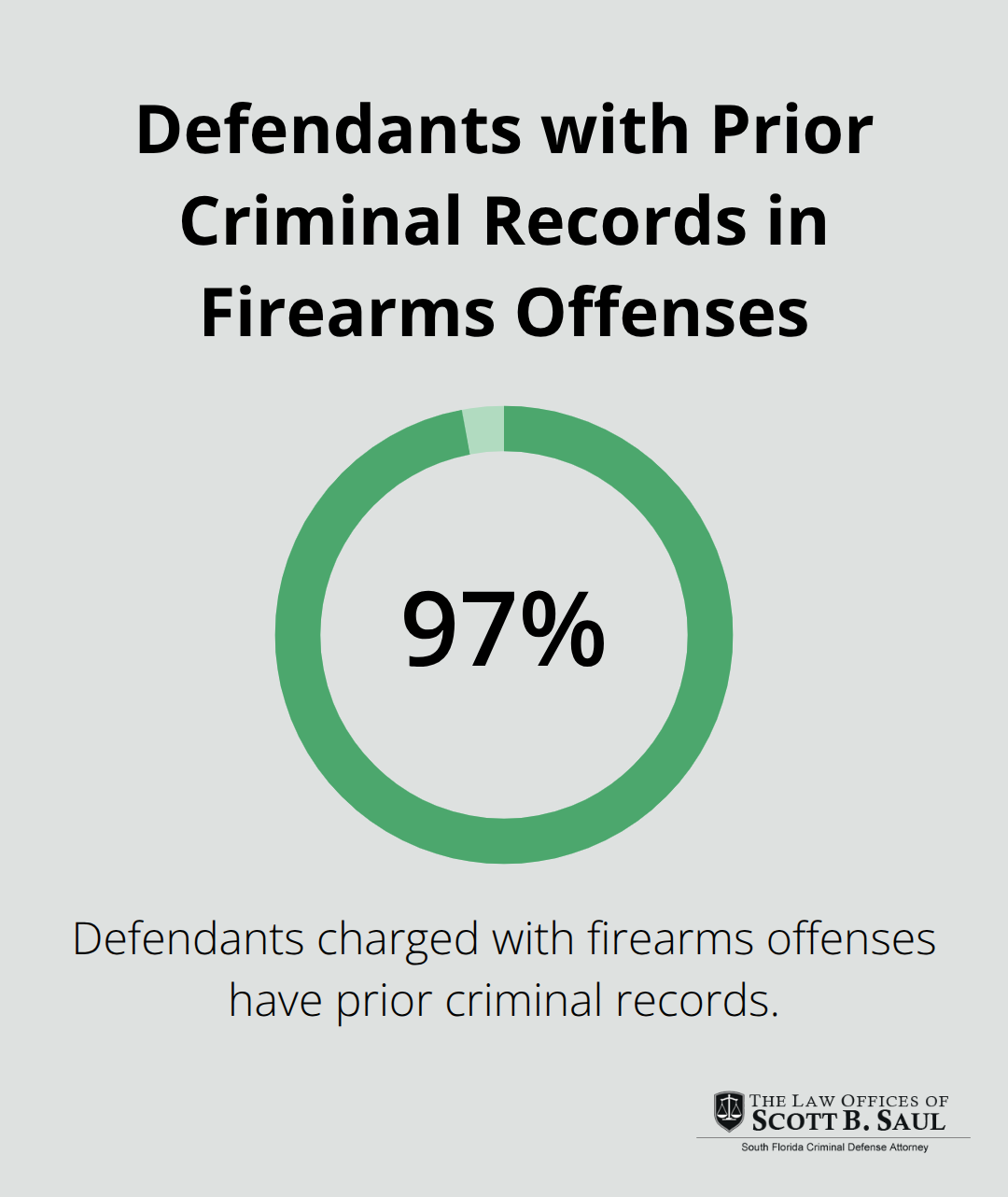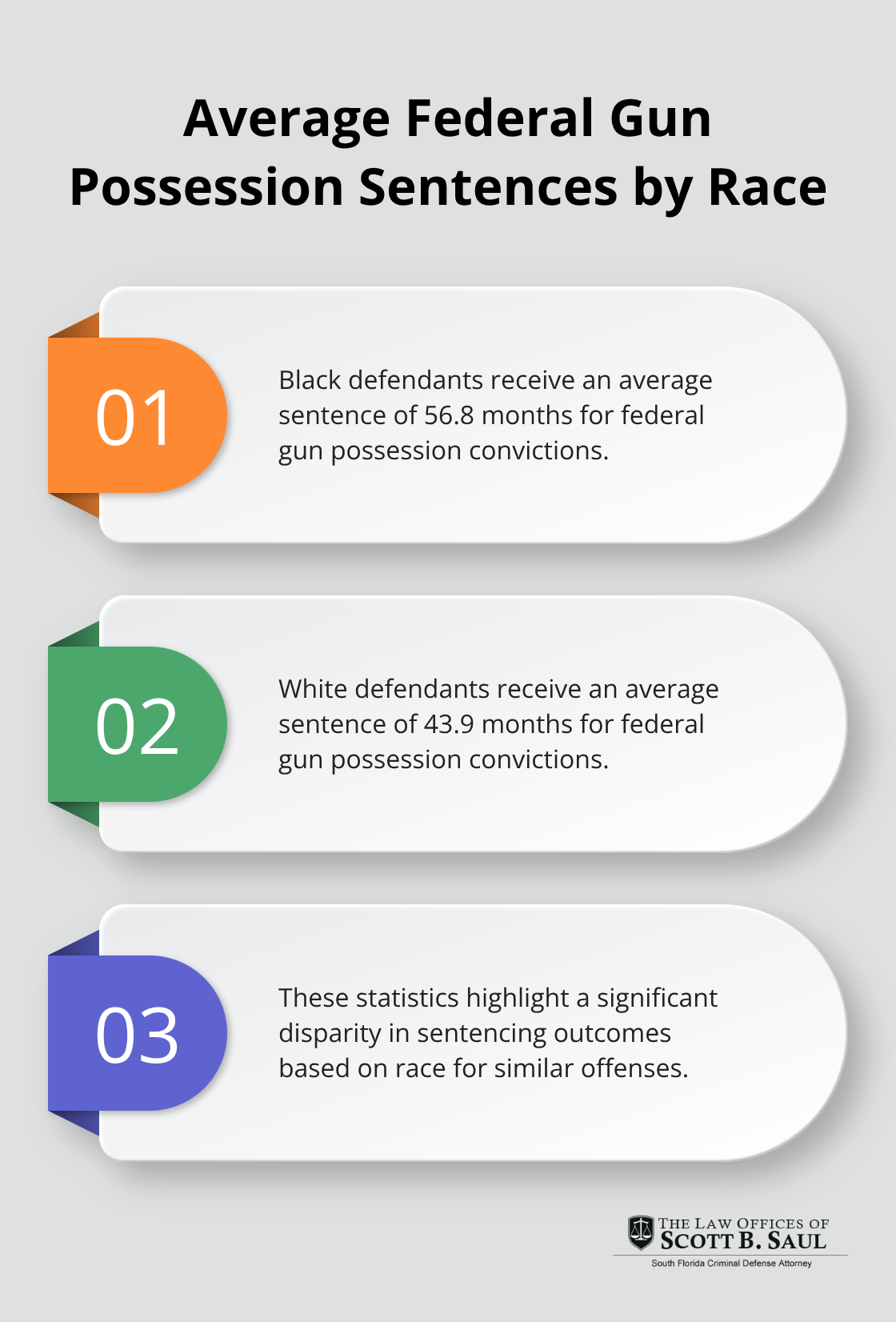Is Illegal Gun Possession a Felony?
By : saulcrim | Category : Criminal Defense | Comments Off on Is Illegal Gun Possession a Felony?
25th Sep 2025

Gun possession charges can range from misdemeanors to serious felonies depending on specific circumstances. The answer to “is illegal gun possession a felony” depends on factors like your criminal history, the type of firearm, and applicable state laws.
We at Law Offices of Scott B. Saul see clients facing these complex charges regularly. Understanding the distinction between misdemeanor and felony gun possession can significantly impact your future and freedom.
Which Laws Apply to Your Gun Possession Case
Federal and state laws create a complex web of gun possession regulations that often overlap and contradict each other. The Gun Control Act of 1968 establishes the foundation for federal restrictions, while each state adds its own layer of rules. Federal law prohibits nine specific categories of people from possessing firearms, including anyone convicted of a crime punishable by more than one year in prison. State laws frequently expand these restrictions further, creating additional prohibited categories that can turn legal possession under federal law into a state felony.

Federal Prohibited Person Categories
Federal law under 18 U.S.C. § 922(g) restricts gun rights for individuals with felony convictions, those under domestic violence restraining orders, and people convicted of misdemeanor domestic violence crimes. The Lautenberg Amendment of 1996 added the domestic violence misdemeanor ban, affecting thousands of law enforcement officers who lost their jobs overnight.
Veterans with dishonorable discharges also face lifetime bans. Mental health adjudications trigger federal prohibitions, though the criteria remain unclear in many cases. Drug users face restrictions, but enforcement varies dramatically across jurisdictions.
State Law Complications
State laws create additional prohibited categories that federal law does not recognize. Some states ban possession for misdemeanor assault convictions, while others restrict rights for tax evasion or wildlife violations. Florida prohibits possession for anyone committed to a mental health facility, even voluntarily.
California extends restrictions to individuals with restraining orders that federal law does not cover. These state-specific rules mean legal possession in one state can become a felony when crossing state lines. The FBI’s National Instant Criminal Background Check System processes firearms background checks, leaving significant gaps in enforcement.
How Multiple Jurisdictions Affect Your Case
The overlap between federal and state laws creates prosecution options that can dramatically impact your charges. Federal prosecutors may choose to pursue cases in federal court where mandatory minimums apply, while state prosecutors might file charges under more lenient state statutes. This jurisdictional complexity means identical facts can result in vastly different penalties depending on which court system handles your case. Understanding how to avoid illegal gun possession charges requires navigating both federal and state requirements carefully.
When Does Gun Possession Become a Felony
Criminal history transforms gun possession charges from misdemeanors into serious felonies with devastating consequences. First-time offenders often face misdemeanor charges under state law, typically resulting in up to one year in jail and fines around $1,000. However, federal prosecutors increasingly target even first-time offenders under 18 U.S.C. § 922(g), which carries a maximum 10-year prison sentence. The difference is stark: state misdemeanor charges might result in probation, while federal felony charges almost guarantee prison time.

Prior Convictions Create Mandatory Minimums
Federal statistics show that 97% of defendants charged with firearms offenses have prior criminal records, which makes repeat offender status nearly universal in federal court. The Armed Career Criminal Act mandates 15-year minimum sentences for anyone with three prior violent felonies or serious drug offenses who illegally possesses a firearm. Average sentences under this law reached 182 months in fiscal year 2016 (according to U.S. Sentencing Commission data). Black defendants face particularly harsh treatment, with average sentences of 165 months compared to shorter terms for other racial groups. Texas and Missouri lead prosecutions with 756 and 704 federal sentences respectively.
Specific Circumstances Trigger Automatic Felonies
Certain circumstances automatically elevate gun possession to felony status regardless of criminal history. Possession of firearms while someone commits drug trafficking or violent crimes triggers mandatory minimums under 18 U.S.C. § 924(c), with average sentences that exceed 12 years. Multiple firearm counts result in sentences that average 327 months, as each additional count adds mandatory consecutive time. Domestic violence restraining orders (even temporary ones) convert otherwise legal possession into federal felonies.
Weapon Types That Guarantee Felony Charges
Machine guns, unregistered National Firearms Act weapons, and firearms with obliterated serial numbers carry automatic felony classifications with severe mandatory minimums that judges cannot reduce. These weapon-specific violations often result in the harshest penalties available under federal law. The penalties and consequences of these felony convictions extend far beyond prison time and affect every aspect of your future.
What Are the Real Consequences of Illegal Gun Possession
Prison Sentences That Destroy Lives
Federal gun possession convictions result in prison sentences that average 56.8 months for Black defendants and 43.9 months for White defendants according to U.S. Sentencing Commission data. These numbers reflect actual time served, not suspended sentences or probation. Federal judges sentenced 8,481 individuals for illegal firearms possession in 2019 alone, with 97% receiving prison time rather than alternatives.

The Armed Career Criminal Act affects sentencing outcomes, while defendants face multiple counts under 18 U.S.C. § 924(c) receive sentences that average 327 months. State courts impose lighter sentences initially, but repeat offenses trigger harsh mandatory minimums that judges cannot reduce. Fines reach $250,000 for federal felonies, though courts often waive these when defendants lack assets to pay.
Permanent Loss of Civil Rights
Gun possession felonies permanently strip away fundamental civil rights that never return automatically. Voting rights disappear in many states, jury service becomes impossible, and public office remains permanently off-limits. Federal law bans all future firearm possession for life with extremely limited exceptions for pardons or expungements (which rarely succeed).
The ban extends to ammunition possession, making hunting, sport shooting, and self-defense legally impossible. Professional licenses for law enforcement, security, and many other careers become unattainable. Military service ends immediately for active personnel, while veterans lose benefits in some cases.
Career Destruction Beyond Prison
Employment discrimination against felons remains legal in most industries, creating permanent economic disadvantage. Professional licensing boards revoke credentials for lawyers, doctors, nurses, teachers, and financial professionals based solely on gun possession convictions. Federal employment becomes impossible, eliminating entire career paths in government service.
Security clearances disappear permanently, ending careers in defense contracting, law enforcement, and sensitive industries. Many employers conduct background checks that reveal these convictions decades later, limiting job prospects throughout life. Background checks reveal these convictions permanently, affecting housing applications, employment opportunities, and even volunteer positions with youth organizations.
Final Thoughts
Is illegal gun possession a felony? Your criminal history, possession circumstances, and prosecuting court system determine the answer. First-time offenders might face state misdemeanor charges, but federal prosecutors increasingly pursue felony cases with 10-year maximum sentences. Prior convictions transform possession into mandatory minimum cases with average sentences that exceed 12 years.
Felony convictions permanently eliminate voting rights, professional licenses, and future gun ownership. Employment discrimination becomes legal and destroys career prospects across multiple industries. Federal statistics show 8,481 people received sentences for illegal firearms possession in 2019, with 97% facing prison time rather than probation (according to U.S. Sentencing Commission data).
These cases demand immediate professional intervention. We at Law Offices of Scott B. Saul defend gun possession charges with extensive experience in federal and state courts. Contact experienced criminal defense attorneys immediately if you face gun possession charges. Early intervention can mean the difference between misdemeanor and felony charges, between probation and prison, between preserving your future and losing your civil rights permanently.
Archives
- January 2026 (5)
- December 2025 (9)
- November 2025 (8)
- October 2025 (8)
- September 2025 (9)
- August 2025 (8)
- July 2025 (8)
- June 2025 (9)
- May 2025 (9)
- April 2025 (8)
- March 2025 (9)
- February 2025 (8)
- January 2025 (9)
- December 2024 (10)
- November 2024 (5)
- July 2024 (2)
- June 2024 (2)
- May 2024 (2)
- April 2024 (2)
- March 2024 (2)
- February 2024 (2)
- January 2024 (2)
- December 2023 (2)
- November 2023 (2)
- October 2023 (2)
- September 2023 (2)
- August 2023 (1)
- July 2023 (2)
- June 2023 (2)
- May 2023 (2)
- April 2023 (2)
- March 2023 (2)
- February 2023 (2)
- January 2023 (2)
- December 2022 (2)
- November 2022 (2)
- October 2022 (2)
- September 2022 (2)
- August 2022 (2)
- July 2022 (2)
- June 2022 (2)
- May 2022 (2)
- April 2022 (2)
- March 2022 (2)
- February 2022 (2)
- January 2022 (2)
- December 2021 (2)
- November 2021 (2)
- October 2021 (2)
- September 2021 (2)
- August 2021 (2)
- July 2021 (2)
- June 2021 (2)
- May 2021 (2)
- April 2021 (2)
- September 2020 (5)
- July 2020 (4)
- June 2020 (4)
- May 2020 (4)
- April 2020 (5)
- March 2020 (4)
- February 2020 (4)
- January 2020 (4)
- December 2019 (1)
- November 2019 (4)
- October 2019 (4)
- September 2019 (4)
- August 2019 (4)
- July 2019 (5)
- June 2019 (4)
- May 2019 (4)
- April 2019 (4)
- March 2019 (4)
- February 2019 (4)
- January 2019 (4)
- December 2018 (4)
- November 2018 (5)
- October 2018 (5)
- September 2018 (4)
- August 2018 (4)
- July 2018 (7)
- June 2018 (4)
- May 2018 (4)
- April 2018 (8)
- March 2018 (4)
- February 2018 (4)
- January 2018 (4)
- November 2017 (4)
- October 2017 (4)
- September 2017 (4)
- August 2017 (7)
- July 2017 (6)
- June 2017 (4)
- May 2017 (4)
- April 2017 (4)
- March 2017 (4)
- February 2017 (7)
- January 2017 (4)
- December 2016 (7)
- November 2016 (4)
- October 2016 (4)
- September 2016 (10)
- August 2016 (4)
- July 2016 (4)
- June 2016 (4)
- May 2016 (4)
- April 2016 (4)
- March 2016 (4)
- February 2016 (7)
- January 2016 (4)
- December 2015 (5)
- November 2015 (4)
- October 2015 (7)
- September 2015 (4)
- August 2015 (4)
- July 2015 (13)
- June 2015 (9)
- May 2015 (8)
- April 2015 (6)
- March 2015 (4)
- February 2015 (4)
- January 2015 (4)
- December 2014 (4)
- November 2014 (4)
- October 2014 (4)
- September 2014 (3)
Categories
- Adjudication (1)
- Bankruptcy (1)
- Burglary Crimes (3)
- calendar call (1)
- Car Accident (1)
- Criminal Defense (386)
- Cyber Crimes (7)
- DNA (1)
- Domestic Violence (9)
- Drug Crimes (5)
- DUI (12)
- Embezzlement (1)
- Environmental Crimes (4)
- Expungement Law (2)
- Federal Sentencing Law (3)
- Firearm (3)
- Forgery (4)
- General (82)
- Healthcare (3)
- Immigration (1)
- Indentity Theft (1)
- Insurance (5)
- judicial sounding (2)
- Juvenile Crimes (4)
- Manslaughter (4)
- Money Laundering (3)
- Organized Crime (1)
- Racketeering (1)
- Reckless Driving (3)
- RICO (3)
- Sealing and Expunging (2)
- Sex Offense (1)
- Shoplifting (1)
- Suspended Driver's License (1)
- Traffic (4)
- Trending Topics (1)
- White-collar Offenses (1)

